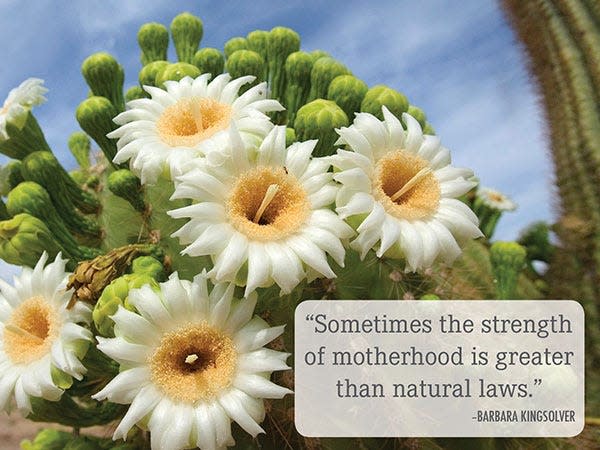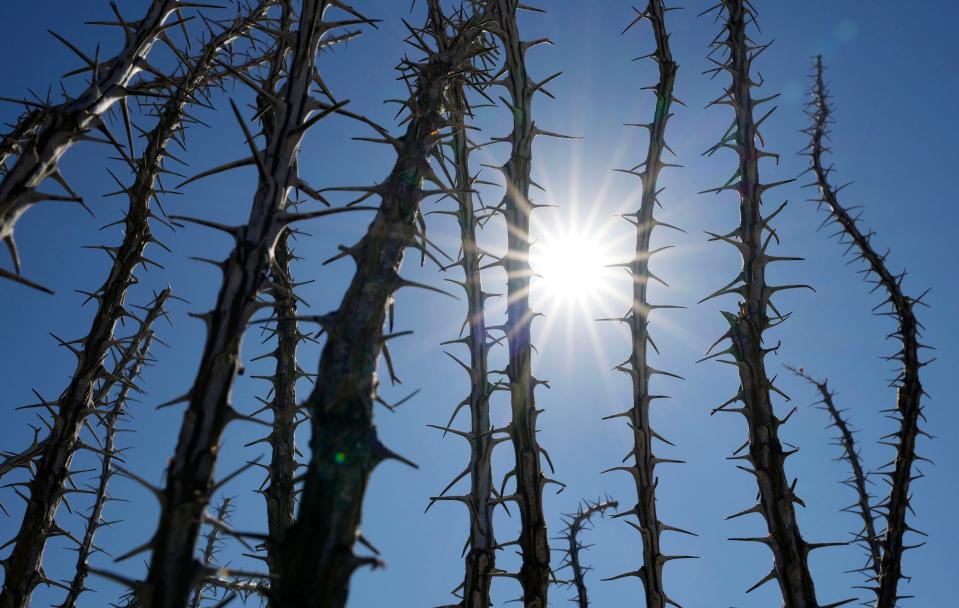Environmental storyteller Barbara Kingsolver channels the voice of a lost boy in Appalachian coal country
- Oops!Something went wrong.Please try again later.
- Oops!Something went wrong.Please try again later.

Barbara Kingsolver's new novel, released Tuesday, doesn't deal with climate change directly, as some of her past works have. But the socioeconomic upheavals accompanying rising average temperatures and the heated politics of the renewable energy transition have a way of seeping into any modern tale. In the expert hands of this environmental writer, climate casts its shadow over "Demon Copperhead."
A University of Arizona graduate with a master's in biology and a Tucson resident for two decades, Kingsolver is a familiar name in Arizona and in the climate fiction genre, "cli-fi." Her 2012 novel, "Flight Behavior," told the real story of how warming temperatures are altering monarch butterfly migration success through the fictional observations of a desperately bored housewife on a rural Tennessee sheep farm.
Kingsolver has crafted a stunning career out of breathing biological themes into stories about complex, underrepresented people and places, teaching readers about real science and cultural issues using voices not often included in those conversations. And she has a stack of literary awards, a 2000 National Humanities Medal among them, to show for it.
Perhaps the most famous of her 11 best-selling books is "The Poisonwood Bible," which tells the story of a zealous Southern Baptist missionary who drags his young wife and four girls to the Belgian Congo in the 1960s, hell-bent on showing Africans how to live, only to find that his own family lacked the skills to survive this destitute, colonialized, flood-prone and snake-infested reality.

Many of Kingsolver's other works have desert themes, inspired by her time wandering dry washes and studying termites in Southwestern landscapes. In her debut novel, "The Bean Trees," one character warns another about Tucson's extreme summer heat:
"Heat waves rising from the pavement made the brown grass and the palm tree trunks appear to wiggle above the sidewalk, making Lou Ann think of cartoons she had seen of strange lands where palm trees did the hula. They reached the little bus stop with its concrete bench. 'Don’t sit on it,' she warned. 'It’ll be hot as a poker in this sun.'"
That passage was published in 1988 and those benches, along with any other surface you might want to sit on outside during the Arizona summer, have grown hotter since. As concentrations of greenhouse gases released from burning fossil fuels for energy result in more heat from the sun stored in the atmosphere, Phoenix and other regions have documented increases in average temperature highs and lows, heat wave duration, thunderstorm intensity and heat-related illness.
Climate explained: Not-so-natural disasters are on the rise. What in the world is going on?
For the past three decades of rising mercury and natural disasters, Kingsolver has been a steady, poetic voice for the rapidly-changing environment and the people who depend on it retaining some normalcy (that's everyone). Last year, James Shaw, New Zealand's minister of climate change, hosted her for a podcast conversation about her take on "the politics of consumption, equality, and climate change." Fans of cli-fi see the genre as another promising front on which to educate and mobilize for climate action.
Tempe to host Kingsolver on Friday
Though she's now a global name, Kingsolver's ties to Arizona and intimate knowledge, as a biologist and journalist both, of its flora, fauna, minerals, people and cultural history feature prominently in her renderings of humans' relationship with nature.
In "Animal Dreams" (1990), Hispanic and Indigenous communities face crop failures, limited medical care and water pollution outside of Tucson. "Holding the Line" (1989) is the definitive nonfiction account of the 1980s worker strike at the Phelps Dodge copper mine near Arizona's eastern border. A lighter nonfiction account published with the essay collection "High Tide in Tucson" (1995) tells the story of Kingsolver accidentally bringing a hermit crab home from the beach and then endeavoring to make a new life for it in the desert. "Prodigal Summer" (2000), while not set in Arizona, features a familiar desert character in its chronicling of a biologist's fascination with a family of coyotes.
Animal, vegetable, miracle thoughts: Climate change could push produce prices higher, slowing the fight for food justice
This may be why Tempe made it onto the short list for her 10-stop book tour that started Tuesday and continues into early November.
On Friday at 6 p.m., Changing Hands bookstore in Tempe (6428 S. McClintock Drive) will host Kingsolver as she discusses her new work, "Demon Copperhead." The event is free with advanced registration and purchase of the book on the bookstore's website. In an emailed response to The Arizona Republic, shop co-owner Gayle Shanks called Kingsolver's work "a heartfelt message to preserve what we have left of our beleaguered planet."
Attendees will join a movement of readers currently exploring Kingsolver's latest. In a (slightly bizarre) video endorsement that aired Tuesday on "CBS Mornings," Oprah announced the novel as her next book club pick, singing its praises as an autumn comfort read.
"As we enter fall, with the slight crisp in the air and the leaves starting to turn, our next book club selection is perfect to curl up with," Oprah beams to the camera from somewhere leafy. "Set in the mountains of the southern Appalachians, from the very first sentence, you're going to be intrigued by this epic story of this young boy, Demon Copperhead."
We’re announcing @oprahsbookclub latest pick: Bestselling author Barbara Kingsolver’s “Demon Copperhead.”
Kingsolver shares why the story is so personal to her — and how a trip to Charles Dickens’ residence inspired her. pic.twitter.com/mvCkU4is30— CBS Mornings (@CBSMornings) October 18, 2022
In truth, the novel is tragic, a series of train wrecks derailing a young boy's life as he tries, and often fails, to escape the ruin he fears may be his destiny as a child left to fend for himself in opioid-riddled coal country. Kingsolver's gift for dialogue and compelling characters moves the story forward, but it can be a tense read wondering what new horror awaits red-headed Damon, nicknamed "Demon," at the turn of each page.
Kingsolver, who grew up in rural Kentucky and now lives in eastern Virginia, is a child of Appalachia herself. She has a passion for giving readers a rare glimpse, maybe even one that could inspire positive change, of common hardships in these "backwoods."
"(Appalachia) is my home and I love it, and Appalachia also has its challenges," Kingsolver told Gayle King on Tuesday on "CBS Mornings." "And one of them in recent decades is the opioid epidemic. And the worst of it is that we have a generation of kids that have been orphaned by opioid use disorder. And, sort of, as the attention of the world moves on, I wanted to tell the story of these kids because it's not over for them."
Read the climate series: The latest from Joan Meiners at azcentral, a column on climate change that publishes weekly
She said she felt called to model the book after Charles Dickens' "David Copperfield" (1850), a classic about a boy navigating poverty, child labor, criminal injustices, absent adults, abusive schools and other failings of Victorian England. She even started her modern take from the very desk in the ocean-side mansion, now an inn, where Dickens once wrote.
"I just started feeling his anger, the anger he channeled in his books," Kingsolver told King. "Orphans, kids thrown away by society, that's his whole wheelhouse. It was like he charged me with his mission — he said, 'You gotta do this.'"
The wisdom creaking to her from Dickens' old furniture, she said, was that the "key to get into the house" of recounting these modern failings is "you let the child tell the story, nobody doubts the child."
A tale of 2 crises
The story young Damon "Demon" Copperhead tells weaves together failings of our modern medical system — namely the overprescribing of addictive opioid painkillers that has driven up overdose deaths since 1999 and killed 68,000 people in 2020 alone, according to the National Institutes of Health — with the ways our reckless use of natural resources placed Appalachia's coal country right in its bull's-eye.
Coal is one of the dirtiest fossil fuels, resulting in emissions that exacerbate climate warming and accelerate flooding, drought, crop failures and pollution that often hit poor and minority communities hardest. But while the transition to renewable energy sources is what the vast majority of scientists say is best for our overall future on this planet as a species, that shift engenders its own injustices.
Parts of Appalachia have been built up around the coal industry, with mountaintop mining companies representing the region's major employers. With the push to reduce emissions comes a major reorganization of the only life many people in that area have ever known. Kingsolver even suggests that social resources were withheld from these rural communities in an effort to tie its economy to the success of coal.
"Nobody needed to get all that educated for being a miner, so they let the schools go to rot. And they made sure no mills or factories got in the door. Coal only," Demon narrates.
Between 2019 and 2020, the productive capacity of coal mines dropped by 26% in Kentucky, 24% in Pennsylvania and nearly 16% in West Virginia, according to the U.S. Energy Information Administration. Job losses trended accordingly. Workers trained in the hard and hazardous labor of coal mining were out of work by the tens of thousands, with little to turn to, and a legion of doctors on drug company incentive plans prescribing painkillers that, in the early 2000s, they believed were not addictive.
Recent reports from the Intergovernmental Panel on Climate Change have acknowledged that the necessary energy transition will have equity issues, just as climate impacts do. Nonprofits and policy groups are working to address this, but the path forward is not yet clear, perhaps because the issue has been swept into some of our country's darkest, backwoods corners.
Equitable solutions: Climate report draws an arc toward environmental justice, seeking equitable emissions cuts
As Kingsolver knows from her days studying ecology at the University of Arizona, complex and interwoven systems can have long-term, profound and cascading influences on each other in ways that are often difficult to predict or control. In "Demon Copperhead," she seemingly breaks from her long-standing track record as an environmental writer of strong female characters to try something new, channeling the voice of a disenfranchised boy lost in the failures of our social system.
It's a testament to her storytelling mastery that this novel also illustrates how deeply intertwined our attitudes about nature are with our collective destiny. As always, her purpose is to make us think about the ways we all must look out for each other.
Joan Meiners is the climate news and storytelling reporter at The Arizona Republic and azcentral. Before becoming a journalist, she completed a doctorate in ecology. Follow Joan on Twitter at @beecycles or email her at joan.meiners@arizonarepublic.com.
Please support climate coverage and local journalism by subscribing to azcentral.com at this link.
This article originally appeared on Arizona Republic: Writer Barbara Kingsolver turns to coal country and opioid crisis

